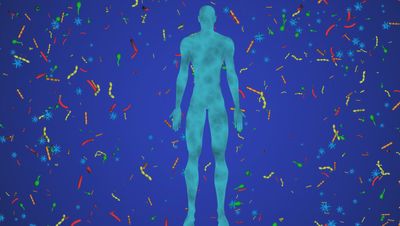A scholar of science, circa 2218, might look back on this era and wonder why, all of a sudden, scientists became so obsessed with human stool. Or more accurately, the microorganisms therein.
Although every human is nearly identical genetically, each person carries around a massively different variety of microbial genes from bacteria, fungi, viruses, and archaea.
This scholar might find, for example, the seven-fold increase in PubMed articles on "gut microbiome" in the half-decade between 2012 and 2017; the plastic detritus of millions of fecal sample collection kits, and evidence that freezers in research labs worldwide had filled up with fecal samples. What's happened?
Human genome science has led to some important medical insights over time. Now it's moving over for the microorganisms. Because, although every human is nearly identical genetically, each person carries around a massively different variety of microbial genes from bacteria, fungi, viruses, and archaea—genes that are collectively called the microbiome.
Thinking that more knowledge about the gut microbiome is going to solve every problem in medicine is pure hubris. And yet these microorganisms seem to be at the nexus of humans and our environment, capable of changing us metabolically and adjusting our immune systems. What might they have the power to do?
Here are five of the most important questions that lie ahead for microbiome science.
1) What makes a gut microbiome 'healthy'?
The words "healthy microbiome" should raise a red flag. Because, currently, if scientists examine the gut microbial community of a single individual they have no way of knowing whether or not it qualifies as healthy—nor even what parameter to look at in order to find out. Is it only the names of the bugs that matter, or is it their diversity? Alternatively, is it function—what they're genetically equipped to do?
The words "healthy microbiome" should raise a red flag.
The focused efforts of the Human Microbiome Project were supposed to accomplish the apparently simple task of defining a healthy microbiome, but no clear answers emerged. If researchers could identify the parameters of a healthy microbiota per se, they might have a way to know whether manipulations—from probiotics to fecal transplant—were making a difference that could lead to a good health outcome.
2) Diet can manipulate gut microbes. How does this affect health?
"Many kinds of bacteria in our gut, they're changeable by changing our diet," says Liping Zhao of Shanghai Jiao Tong University in China, citing two large population studiesfrom 2016. What's murkier is how this effects a change in health status.
Zhao's research focuses on making the three-way link between diet, gut microbiota, and health outcome. Meanwhile, researchers like Genelle Healey at the University of British Columbia (UBC) are working to track how the gut microbiome and health respond to a dietary intervention in a personalized way.
Knowing how the diet-induced changes in gut microbes affected health in the long term would allow every individual to toss out the diet books and figure out a dietary pattern—probably as personal as their gut microbes—that would result in their best health down the line.
If scientists could find how to harness one or more microorganisms to have specific effects on the immune system, they might be able to crack a new class of therapeutics.
3) How can gut microorganisms be used to fine-tune the immune system?
Many chronic diseases—autoimmune conditions but also, according to the latest research, obesity and cardiovascular disease—are immune mediated. Kenya Honda of Keio University School of Medicine in Tokyo, Yasmine Belkaid of the US National Institutes of Health (NIH), June Round at University of Utah, and many other researchers are chasing the ways in which gut microbes 'talk' to the immune system. But it's more than just studying certain bugs.
"It's an incredibly complex situation and we can't just label bugs as pro-inflammatory or anti-inflammatory. It's very context-dependent," says Justin Sonnenburg of Stanford. But if scientists could find how to harness a microorganism or group of them to have specific effects on the immune system, they might be able to crack a new class of therapeutics that could change the course of immune-mediated diseases.
4) How can a person's gut microbiome be reconfigured in a lasting way?
Measures of the adult microbiome over time show it has a high degree of stability—in fact, it can be downright stubborn. But a new, stable gut microbial ecology can be achieved when someone receives a fecal transplant for recurrent C. difficile infection. Work by Eric Alm of Massachusetts Institute of Technology (MIT) and others have shown the recipient's gut microbiota ends up looking more like the donor's, with engraftment of particular strains.
But what are the microorganisms' 'rules of engraftment'? Knowing this, it might be possible to intervene in a number of disease-associated microbiome states, changing them in a way that changed the course of the disease.
Is the infant microbiome, as shaped by birth mode and diet, responsible for health issues later in life?
5) How do early-life shapers of the gut microbiome affect health status later on?
Researchers have found two main factors that appear to shape the gut microbiome in early life, at least temporarily: mode of birth (whether vaginal or Cesarean section), and early life diet (whether formula or breast milk). These same factors are associated with an increased risk of immune and metabolic diseases. So is the infant microbiome, as shaped by birth mode and diet, responsible for health issues later in life?
Brett Finlay of the University of British Columbia has made these 'hygiene hypothesis' compatible links between the absence of certain bacteria in early life and asthma later on. "I think the bugs are shaping and pushing how our immune system develops, and if very early in life you don't have those things, it goes to a more allergic-type immune system. If you do have those bugs it gets pushed towards more normal," he says. The work could lead to targeted manipulation of the microbiome in early life to offset negative health effects.
